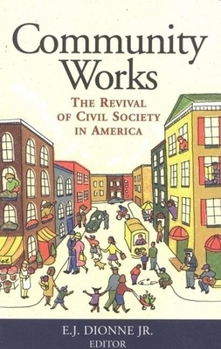Community Works: The Revival of Civil Society in America
Select Format
Select Condition 
Book Overview
America is experiencing a boom of voluntarism and civic mindedness. Community groups are working together to clean up their cities and neighborhoods. People are rejoining churches, civic associations, and Little Leagues. And, at every opportunity, local and national leaders are exhorting citizens to pitch in and do their part.
Why has the concept of a civil society--an entire nation of communities, associations, civic and religious groups, and individuals all working toward the common good--become so popular? Why is so much hope being invested in the voluntary sector? Why is a civil society so important to us?
This book looks at the growing debate over the rise, importance, and consequences of civil society. E.J. Dionne puts the issues of the debate in perspective and explains the deep-rooted developments that are reflected in civil society's revival. Alan Wolfe and Jean Bethke Elshtain discuss reasons why the idea of a civil society is important today. Theda Skocpol and William A. Schambra offer two opposing viewpoints on where successful voluntary civic action originates--nationally or at the local grass roots. John J. DiIulio Jr. shines a light on the success of faith-based programs in the inner-city, and Bruce Katz studies the problems caused by concentrated poverty in those same neighborhoods. Jane Eisner underscores the extent to which the volunteer sector needs organization and support to effectively complete its work. Other contributors include Bill Bradley, William A. Galston, and Gertrude Himmelfarb.
"Related Subjects
Civics & Citizenship Comparative Religion Cultural Education & Reference Job Hunting & Careers Political Science Politics & Government Politics & Social Sciences Public Affairs & Policy Religion Religion & Spirituality Religious Studies Social Science Social Sciences Social Services & Welfare Specific Topics Urban Volunteer Work




